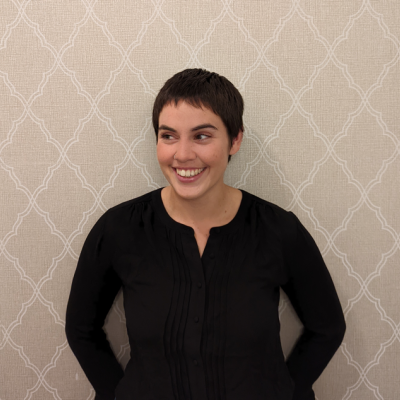For the Fourth Time in 5 Years, Embryo Project Instructor Wins Teaching Excellence Award
Second-year Biology and Society graduate student Risa Schnebly is effusive when she talks about her role as instructor for the Embryo Project writing seminar.
“Teaching this class is literally the most rewarding thing in the world,” she says. “The fact that we get to write about such fascinating historical topics in an environment where we are honoring each other's opinions, giving constructive feedback, and laughing together—it's the best class ever.”
Risa’s enthusiasm for teaching has not gone unnoticed by her graduate student peers, who this year bestowed her with the Graduate and
Professional Students Association (GPSA) Teaching Excellence Award, a significant academic honor that also comes with a $750 cash prize. GPSA gives the award every semester to those graduate student instructors who excel at teaching—by, for example, incorporating active learning in their classroom, encouraging class participation, or using technology in innovative ways. Instructors submit a detailed application, and then several graduate student reviewers come in and observe each instructor in action.
“It’s volunteer grad students recognizing other grad students,” Risa explains.
Risa is actually the fifth Embryo Project instructor to win the teaching award. Her predecessor, Dina Ziganshina, won it in 2020; sisters Carolina Abboud and Alexis Abboud won it in 2018; and Erica O’Neil won before that.
“Dina deserves a lot of credit for the success that I’ve had as a teacher,” Risa says. “She took such love and care in training me to do this job when she was my mentor. And that’s what I’ve tried to do with Baylee Edwards, who is now my new co-instructor for the class.” Baylee is a first-year Biology & Society graduate student who did the 4+1 Bachelors/Master’s program.
Not Your Typical College Class
The Embryo Project class is a writing-intensive seminar in which approximately ten students, both undergraduates and graduates, write between four and six research articles on topics related to embryology, reproduction, and development, often from a historical perspective. Each article is carefully peer-reviewed by fellow class members, and revised multiple times during the course of the semester until it is ready to be published on the Embryo Project Encyclopedia, an open-access journal devoted to promoting science literacy.
The brainchild of Bio & Society Director and University Professor in the School of Life Sciences Jane Maienschein, the Embryo Project Encyclopedia and the associated class began in 2006. To date, students in the course have published more than 1100 articles. The EP Encyclopedia, which is catalogued by PubMed and the Library of Congress, receives roughly 3 million views every year.
“These aren’t your typical college papers that students are writing,” Dr. Maienschein says. “We ensure that they adhere to the highest standards of scholarship and peer review so that they can be a trusted source of information for our readers.”
Maienchein adds: “This course is so much fun because each student learns so much, and they teach each other under the guidance of the instructors.”
Risa was a student in the writing seminar for several semesters before she began teaching the class. Her EP articles have covered topics such as genetic engineering, de-extinction controversies, and the history of sex and gender in the US. Maienschein teases Risa that her first articles were “not-so-great” articles, but understanding why and how to improve them is what makes Risa a first-rate instructor.
As a teacher, Risa sees her role as encouraging and fostering collaboration, rather than serving as the one who has all the answers.
“It's such a privilege to be teaching specifically for the Embryo project because the structure of the class is a collaborative environment,” Risa says. “What makes the class so magical, and what keeps people coming back semester after semester, is that students feel heard and seen, they get to know their peers really well, and they are part of this project—the EP Encyclopedia—that is bigger than all of us.”
Another perk of the job, she says, is seeing the students’ writing improve.
“Especially when it's students who have very little writing experience, to watch them grow as a writer is the most rewarding thing,” Risa says.
“And it’s not like we're the only ones who notice it,” she adds. “They feel themselves becoming better writers too.”
Risa recalls one instance, in particular, when this aspect of the course hit home.
“We had a little potluck at the end of the semester and one student asked to say something. She said, ‘At the beginning of this semester, I had no idea why anyone would ever repeat this class; I didn't think it would be anything special. But this class has been life changing.’ That student ended up taking the class again and stayed with us until she graduated.”
Some stay even longer. “We’ve had Embryo Project students go on to graduate studies at ASU and some even join the EP editing team,” Risa says.
She adds: “Thank you Jane Maienschein for creating this opportunity and letting me be a part of it!”
